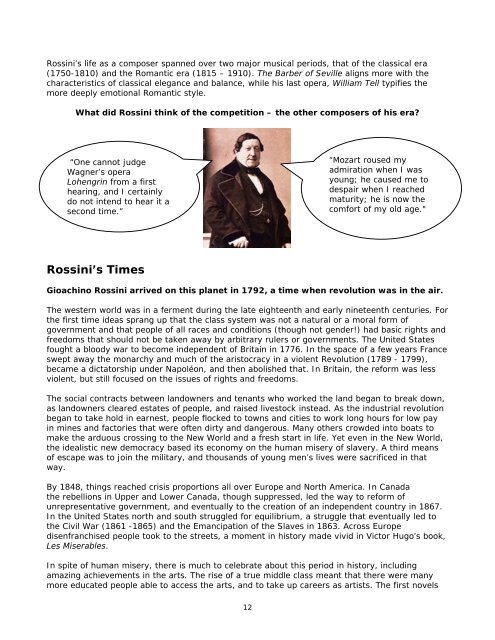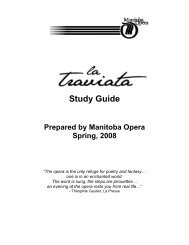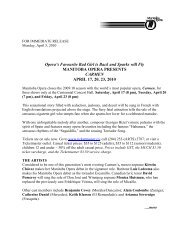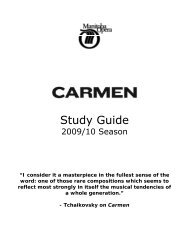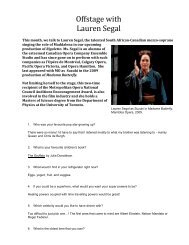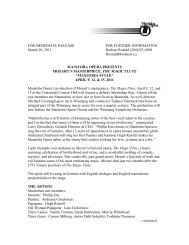The Barber of Seville Study Guide - Manitoba Opera
The Barber of Seville Study Guide - Manitoba Opera
The Barber of Seville Study Guide - Manitoba Opera
You also want an ePaper? Increase the reach of your titles
YUMPU automatically turns print PDFs into web optimized ePapers that Google loves.
Rossini’s life as a composer spanned over two major musical periods, that <strong>of</strong> the classical era<br />
(1750-1810) and the Romantic era (1815 – 1910). <strong>The</strong> <strong>Barber</strong> <strong>of</strong> <strong>Seville</strong> aligns more with the<br />
characteristics <strong>of</strong> classical elegance and balance, while his last opera, William Tell typifies the<br />
more deeply emotional Romantic style.<br />
What did Rossini think <strong>of</strong> the competition – the other composers <strong>of</strong> his era?<br />
“One cannot judge<br />
Wagner’s opera<br />
Lohengrin from a first<br />
hearing, and I certainly<br />
do not intend to hear it a<br />
second time.”<br />
Rossini’s Times<br />
12<br />
“Mozart roused my<br />
admiration when I was<br />
young; he caused me to<br />
despair when I reached<br />
maturity; he is now the<br />
comfort <strong>of</strong> my old age."<br />
Gioachino Rossini arrived on this planet in 1792, a time when revolution was in the air.<br />
<strong>The</strong> western world was in a ferment during the late eighteenth and early nineteenth centuries. For<br />
the first time ideas sprang up that the class system was not a natural or a moral form <strong>of</strong><br />
government and that people <strong>of</strong> all races and conditions (though not gender!) had basic rights and<br />
freedoms that should not be taken away by arbitrary rulers or governments. <strong>The</strong> United States<br />
fought a bloody war to become independent <strong>of</strong> Britain in 1776. In the space <strong>of</strong> a few years France<br />
swept away the monarchy and much <strong>of</strong> the aristocracy in a violent Revolution (1789 - 1799),<br />
became a dictatorship under Napoléon, and then abolished that. In Britain, the reform was less<br />
violent, but still focused on the issues <strong>of</strong> rights and freedoms.<br />
<strong>The</strong> social contracts between landowners and tenants who worked the land began to break down,<br />
as landowners cleared estates <strong>of</strong> people, and raised livestock instead. As the industrial revolution<br />
began to take hold in earnest, people flocked to towns and cities to work long hours for low pay<br />
in mines and factories that were <strong>of</strong>ten dirty and dangerous. Many others crowded into boats to<br />
make the arduous crossing to the New World and a fresh start in life. Yet even in the New World,<br />
the idealistic new democracy based its economy on the human misery <strong>of</strong> slavery. A third means<br />
<strong>of</strong> escape was to join the military, and thousands <strong>of</strong> young men’s lives were sacrificed in that<br />
way.<br />
By 1848, things reached crisis proportions all over Europe and North America. In Canada<br />
the rebellions in Upper and Lower Canada, though suppressed, led the way to reform <strong>of</strong><br />
unrepresentative government, and eventually to the creation <strong>of</strong> an independent country in 1867.<br />
In the United States north and south struggled for equilibrium, a struggle that eventually led to<br />
the Civil War (1861 -1865) and the Emancipation <strong>of</strong> the Slaves in 1863. Across Europe<br />
disenfranchised people took to the streets, a moment in history made vivid in Victor Hugo’s book,<br />
Les Miserables.<br />
In spite <strong>of</strong> human misery, there is much to celebrate about this period in history, including<br />
amazing achievements in the arts. <strong>The</strong> rise <strong>of</strong> a true middle class meant that there were many<br />
more educated people able to access the arts, and to take up careers as artists. <strong>The</strong> first novels


